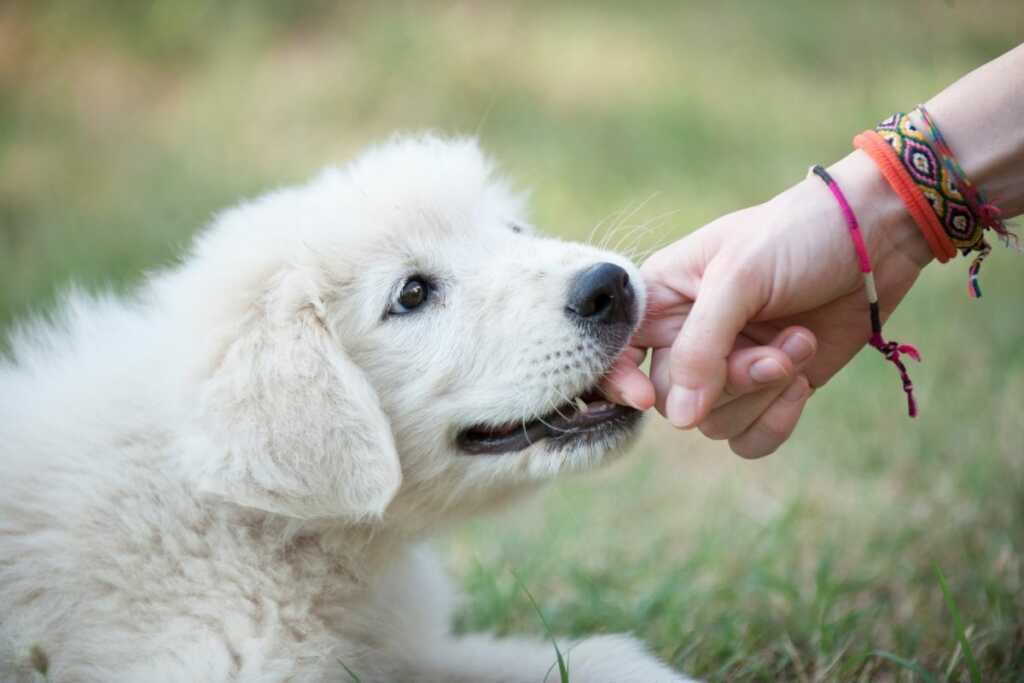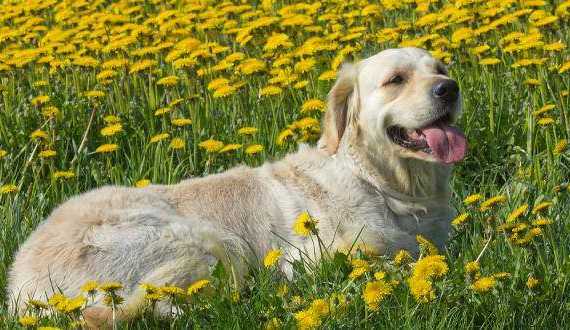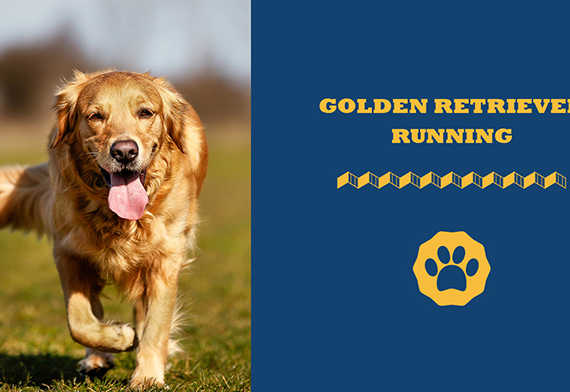Updated: July 3rd, 2023
Even the most adorable puppies can sometimes get nippy. If your puppy won’t stop biting you, then you probably know just how frustrating this behavior can be.
Fortunately, there are things you can do to curb this behavior.
Puppies are, for the most part, cute and cuddly fur babies that will brighten up your day. However, naughty behavior like biting is not uncommon.
Puppies like to play and explore, and sometimes they will use their mouths to do this.
When you are on the receiving end of these bites, the cuteness factor can diminish pretty fast.
If you’ve tried everything and your puppy still won’t stop biting, we have some insights for you. Let’s take an in-depth look at biting behavior in puppies and how to stop it.
QUICK RECOMMENDATION: My puppies have drawn blood with their teeth many times. The Milunova Pupr Pals™ Dog Toy is a plush squirrel puppet toy that helps to protect your hands from those sharp puppy teeth during play.

I was recently talking to a friend who told me my puppy won’t stop biting me!? What should I do?
My #1 answer to this question is to grab your puppy’s favorite chew toy, redirect his bitey behavior, and ignore him until he has calmed down.
Redirection has been our favorite method for stopping a biting puppy but there are many other possible solutions. So read on to find out more.
\Why Is Your Puppy Biting You?
Is your puppy just being naughty, or is there another reason for its biting behavior?
A mouthy puppy can be a handful, so figuring out just why your puppy bites is important.
Exploring
Puppies are not just playful; they are also curious little explorers.
This means that they will try to interact with their environments at every opportunity.
Unfortunately, puppies tend to use their mouths to explore, which can often lead to biting.
When your puppy bites you, he or she may simply be trying to interact with you.
They may not know that they are hurting you. This is why training is essential from an early age: to teach your young dog what is acceptable behavior and what is not.
Boredom
If your puppy is in an environment where there is little mental stimulation, boredom can drive him or her to destructive behavior.
Puppies are very playful, and they need to be kept engaged to be happy.
Nipping may be your puppy’s way of getting your attention when they are bored.
Keeping your puppy occupied with toys and playtime can minimize such destructive behavior.
Boredom can also make your puppy overdependent on you.
A bored puppy will do anything to get your attention, including biting. Your puppy should be able to play independently without your constant attention.
Anxiety
New experiences and situations can be scary for your adorable pup. A scared puppy can bite in reaction to a perceived threat or to get your attention.
Since your puppy is still young, many experiences will be new to them. Some of these new experiences may trigger fear or anxiety.
It is important to observe your puppy and understand what situations or circumstances cause them to become nippy.
For instance, some puppies may suffer from separation anxiety. This means your puppy may bite you when you leave home or return.
This is their way of expressing frustration with being left alone.
Anxiety can lead to aggression and other destructive behavior. When your puppy does not feel calm or safe, their anxiety may manifest in biting behavior.
Poor Socialization
Socialization means introducing your puppy to new experiences. This could be exposure to other pets, people, or outdoor experiences.
The more familiar your puppy is with their surroundings, the less likely they are to misbehave.
A poorly-socialized puppy will be anxious and territorial because they do not know what is a threat and what isn’t.
This can breed aggression which will, in turn, manifest in behaviors such as biting and growling.
Socialization should be done as early as possible so that your puppy gets used to interacting with people, other pets, and their environment.
This will help to build positive interactions and avoid unnecessary aggression.
Making a point of introducing your puppy gradually to new situations is the best way of staving off destructive behavior.
Your efforts will also have a big impact on how your dog interacts with their environment, even in adulthood.
Teething
Teething can be an uncomfortable experience for your pooch.
To alleviate some of their misery, puppies get the urge to chew on things when they are teething. This may lead to biting behavior.
In cases where your dog’s biting is a response to teething, your puppy may stop biting once the teething process has finished.
However, in some cases, this behavior will persist.
Chew toys are a great way of keeping your puppy comfortable during the teething process.
They will keep your pup occupied and give them something to bite on that isn’t you!
Chew toys are also developmentally appropriate for older dogs, and a great way to occupy a restless pup.
How Can You Get Your Puppy To Stop Biting
Biting and nipping can be painful and frustrating.
Additionally, if this behavior is not stopped early on, your puppy may carry this behavior into adulthood, which can become dangerous.
So how do you stop your fur baby from using you as a chew toy?
1. Yelp
When your puppy is biting you, they are not intentionally behaving maliciously.
In doggie speak, a bite or nip may be their way of playing with you or getting your attention.
This means it is your job to let your puppy know that they are hurting you, and that biting is not acceptable.
When your puppy bites you, do not push them away playfully or pet them. Yelp, loudly and in a high-pitched tone to communicate clearly that you are in pain.
Yelping may not work the first or second time you do it.
However, if you repeat it consistently every time your puppy bites, they should soon understand that biting is not acceptable.
Be patient and consistent with this, because puppies learn from repeated training.
If you combine this reaction with other training methods, you are bound to see positive results.
PRO TIP: This method does not always work. We’ve had success and failure with the YELP! Some puppies find it exciting and continue their mouthy ways.
2. Distract The Puppy
Puppies will sometimes bite out of boredom or anxiety. This means that you need to refocus their attention on something else to calm them down.
Once your puppy bites you, start by yelping to communicate that you are in pain. Follow this up by offering them a toy or placing them in an area where they can play.
Redirection teaches the puppy to play with things other than your feet or hands.
This is important because it also teaches the puppy to play independently without having to constantly engage your attention.
As with the yelping, be consistent about redirecting your puppy when they start to nip.
Puppies learn best when an action is repeated, so redirecting only once will not be productive toward your goal.
PRO TIP: Redirecting is our favorite and most effective way of deterring biting. After redirecting our puppies we do the next step and ignore them and let them play independently until they calm down.
3. Ignore The Puppy
Why do puppies continue to bite?
Simple: because it works. Every time your puppy bites you, they get your attention. This trains the puppy that biting gets them what they want.
If you always respond to your puppy’s destructive behavior, they will learn to use it when they want attention.
Attention reinforces the bad habit, making it even more difficult to eliminate.
If you have yelped and tried distraction, but the combined efforts are not working, the next step to try is ignoring your puppy.
Quickly turn away from the puppy and face away from them. Cross your arms to conceal your hands. Do not give them any attention until they calm down or walk away.
The point of ignoring your puppy when it is acting up is to show them that they will only be rewarded when they are calm.
If your puppy calms down, you can turn your attention back to them and pet or praise them for staying calm.
If they start acting up again, repeat the step and ignore them until they are calm.
Just like with the other training techniques, this step only works if you are consistent. You want your pup to associate bad behavior with being ignored.
Resist the urge to give in to those adorable eyes– stay firm and consistent. In the end, good behavior benefits your dog just as much as it benefits you.
4. Keep The Puppy Busy
Most mischief, including biting, stems from boredom. A puppy that has nothing to do will undoubtedly find ways of amusing itself.
Toys, puzzles, and sufficient playtime are great ways of keeping your puppy occupied.
The more your puppy expends their energy, the less likely they are to resort to destructive behavior.
Chew toys are especially important when your pup is teething.
These toys will help to keep your dog occupied, and will distract them from any discomfort they may be feeling.
In some cases, you may want to confine your puppy if they are too nippy. However, this can be counter-productive, as they will only grow more anxious and bored.
Do not confine your puppy for extended periods– let them run around and play. This will help to keep them occupied and prevent destructive tendencies.
5. Time Out
Time out is a great way to train your puppy. When you remove your puppy from a situation, you remove the trigger for their bad behavior.
A puppy crate is a convenient solution for time-outs when your puppy will not stop acting out.
PRO TIP: DO NOT use the crate as punishment. We like to redirect our puppy with a chew toy and move them to the crate with the chew toy where they will have a chance to relax.
You can also use a tie down to give your puppy some time away from biting your hands and feet.
However, do not overuse time-outs, as this may cause your puppy even more anxiety. Put your puppy in time out until they settle down.
Once they are calm, remove them and put them back into their normal setting.
If you are consistent, your puppy will soon learn that acting out results in a time out.
6. Socialize Your Puppy
A big part of being a pet parent is ensuring that your fur baby is at ease in their environment.
A puppy that does not know how to interact with their surroundings is more likely to bite.
Socialize your puppy by introducing them to new places, people, and other pets.
Be sure that your puppy is in a safe environment where they do not feel constantly threatened. An anxious puppy will become aggressive in an attempt to protect itself.
7. Professional Training
If you do not have time to train your puppy yourself, a professional dog trainer will come in handy.
Do not feel that you have to train your puppy on your own if you are not making any progress.
Sometimes an experienced trainer will have insights on how to best deal with problem behavior.
Puppies That Bite: What Not To Do
If your puppy is a biter, it is understandable that you may get frustrated from time to time.
However, there are some things you should never do in an attempt to remedy biting behavior.
DO NOT Use Physical Force To Punish Your Puppy
Ultimately your puppy is just a baby, and simply needs to be trained. Physical force is not only cruel, but is also ineffective as a training method.
Squeezing your puppy’s mouth shut, kicking them, or muzzling them only causes anxiety and, as a result, potentially more aggression.
This kind of abuse will also create a negative atmosphere for your pup and, in many cases can actually breed more aggressive tendencies.
DO NOT Leave Young Children With Puppies
No matter how adorable your puppy is, biting and nipping can be dangerous especially where children are involved.
If your puppy tends to bite, never leave it unsupervised around babies or young children.
A child may not be able to protect themselves from a biting puppy so keeping them safe is the only option.
DO NOT Starve Your Puppy
A hungry puppy is more likely to bite. Make sure your puppy is getting the recommended amount of food each day based on body weight.
Never punish your puppy by denying them food. This is an ineffective punishment, but also a cruel one.
When Should You Be Concerned About Biting in Puppies
For the most part, puppies will outgrow nipping behavior with proper training.
However, in some cases, biting may point to underlying behavioral issues that could be dangerous.
Here are some warning signs to watch out for:
- Your puppy constantly growls and snaps at small children
- Your puppy bites hard enough to break the skin
- Your puppy displays aggression before biting, for instance, sustaining eye contact or stiffening in posture before attacking
- Your puppy is overly aggressive towards other people or pets
These signs of aggression need to be taken seriously and addressed as quickly as possible.
Aggressive tendencies that are not curbed at an early age will result in aggression in adulthood, which can be dangerous.
Frequently Asked Questions
At What Age Will My Puppy Stop Biting Me?
Puppies should stop biting around the six-month mark.
In most cases, puppies bite to get attention, as a form of play, or when they are teething. With time, most puppies will outgrow the tendency to bite.
It is important to train your puppy from an early age to eliminate problem behaviors such as biting.
If you are having trouble training your puppy, don’t hesitate to get professional help.
Why Is My Puppy Biting Me Aggressively?
If your puppy is biting you aggressively, it could be due to anxiety, teething discomfort, or boredom.
Puppies bite for a variety of reasons, and sometimes they may do so with aggression.
In cases where your puppy is feeling threatened, bored, or anxious, they will bite as a way of defending themselves or to get your attention.
Teething causes discomfort, and this may also cause puppies to resort to biting as a method of self-soothing.
Chew toys will help teething puppies cope with the discomfort and discourage biting.
Behavioral training is also crucial to eliminating aggressive tendencies.
How Do I Stop My Stubborn Puppy From Biting?
You can stop a stubborn puppy from biting by using a combination of behavioral training techniques.
The first step is to ensure that your puppy knows that biting hurts you and is not acceptable.
This is accomplished by yelping loudly every time your puppy bites.
In conjunction with yelping, you need to distract your puppy when they get nippy.
This will teach them to not play with your hands or other parts of your body. It is also important to not give in to your puppy when they try to get your attention by biting.
Should I Muzzle My Puppy For Biting?
No, you should not muzzle your puppy as a punishment for biting.
Muzzling your puppy may cause injury, and it ultimately does not address the underlying cause of the biting behavior.
Behavioral training is more effective when it comes to curbing biting.
Remember to avoid using physical force to train your puppy. You can always consult a professional trainer if needed.
Is A Puppy Biting A Sign Of Affection?
Yes, in some cases, puppies will bite to show affection. Puppies are naturally playful and they will sometimes try to get your attention by biting.
This kind of biting is usually driven by the puppy’s natural instinct to interact with their environment using their mouths.
You can discourage biting by using behavioral training.
Do not assume that your puppy knows biting is wrong; it’s your job to teach them that it is not acceptable.
Final Thoughts
Being a pet parent is very rewarding. However, it also comes with its fair share of responsibilities.
Behavioral training will help to stave off problem behaviors such as biting.
Your puppy is ultimately just a baby, and depends on you to teach them how to behave.
When you teach your puppy what is acceptable and what is not, your pet will be much happier and so will you.
How about you?
Do you have a puppy that loves to bite?
If so, what have you done to help deter your puppy’s bitey behavior?
Tell us about your experiences in the comment section below.



